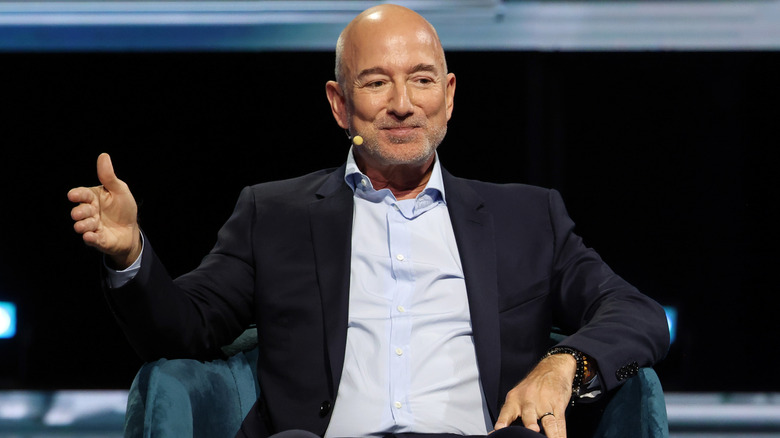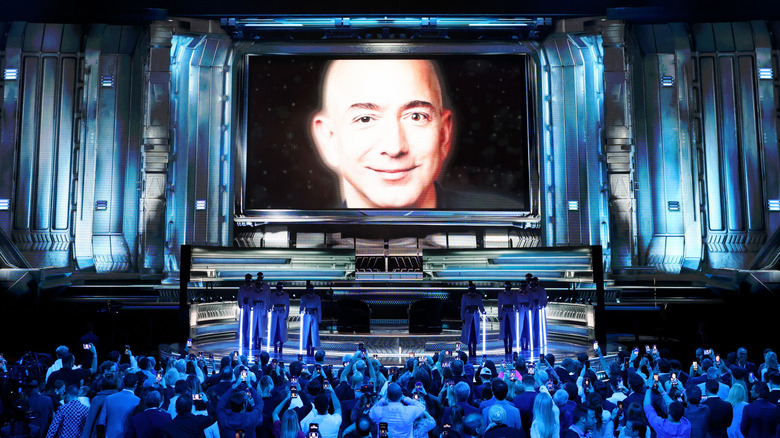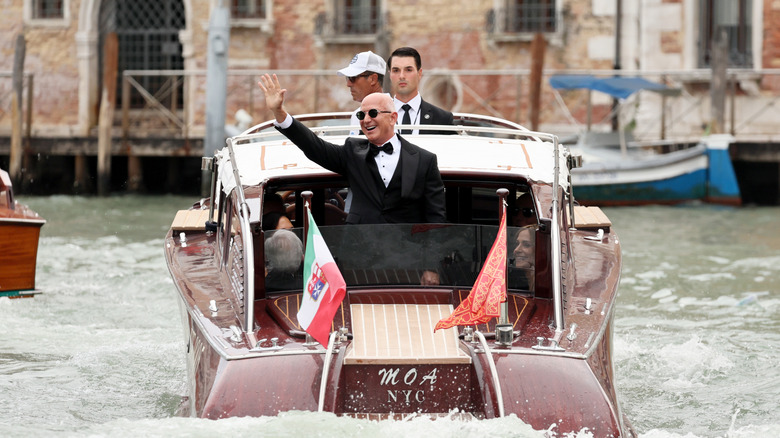Jeff Bezos' Grim US Economy Prediction Is Coming True
It's hard to turn around without encountering a grim financial prediction these days, and many well-known figures in the finance sphere have had something to say about it. Between the budgetary impact tariffs have on families, the rising cost of groceries, and a higher cost of living for most Americans, even some of the wealthiest people in the country are feeling uneasy. While the economy may not ever be grinding too hard on Amazon founder and executive chairman Jeff Bezos, that doesn't change the fact that he made a grim economic prediction that is now coming true.
In a 2023 interview with CNN, Bezos warned, "The economy does not look great right now. Things are slowing down. You're seeing layoffs in many, many sectors of the economy." While this observation may not have predicted the sweeping job losses due to 2025's DOGE job and budget cuts, the labor market has hit a brick wall. Per analysis by Challenger, Gray, and Christmas, hiring frequency is the lowest it's been in 14 years. The company's November 2025 reporting stated the United States had cut more than 1 million jobs by October 2025, the highest layoff total since the COVID-19 pandemic was in full swing in 2020. However, Bezos' fortune-telling didn't stop there.
Bezos warned consumers and small business owners to "play the probabilities" by cutting big spending. He suggested it might be preferable to have some cash reserves, rather than new gear or appliances, if things get even worse — advice that still rings darkly true in 2025.
Bezos' words are relevant to many, but not always to himself
Bezos did not predict economic recession, but his interview confirms the complex nature of what was to come. Even so, in his CNN interview, he clearly pushed risk aversion across the board, saying, "Try to reduce some risk in your business or your life." Bezos floats near the top of the Bloomberg Billionaires Index, and despite being one of the richest men in the world, the advice he gave feels applicable to people in many economic classes.
For business owners, Bezos warned, "Maybe delay some capital purchases. Do you really need that new piece of equipment? Maybe it could wait a little bit," before going on to say that even small precautions like that delay could be what keeps a business afloat amid economic turmoil. Investors in the market have seen wild volatility in 2025, making Bezos' words seem relevant to pretty much all financial sectors. However, the market bursts as much as it sags, and both small and large investments could have significant weight on many individuals' financial situations.
Bezos's suggestion that small business owners avoid risky business also goes against much of what he's done to build his own empire. Bezos is obsessed with taking risks, and he's preoccupied with absorbing competition. In fact, part of why Amazon is so massive is the amount of investment the company made in taking over so many competitors in its path.
Not everyone needs to follow Bezos' advice to a T
Americans spend a ton on Amazon every month, so listening to Bezos' business advice might make sense. However, he founded Amazon out of a garage, as a bookselling operation. He's now backing an AI company to program proteins. That doesn't happen without risk. Bezos has been accused of underpaying workers, sneakily underpaying himself, and doing everything to avoid taxes. It takes more than greed and avarice to succeed, but a close look at Bezos's early history shows a degree of strategy beyond using brutish amounts of cash to buy up everything around him.
"Take as much risk off the table as you can for yourself," Bezos insisted at the end of his CNN interview. Frugality and austerity may work for surviving the toughest of economic times, but no one knows an individual business better than the owner. Penny pinching too heavily can be the reason a small business fails, rather than thrives. Not purchasing a desperately needed new appliance like a fridge could mean a lot of food and energy goes to waste, and money would go along with it. Everyone must try to best weigh their own economic decisions with their own reality. For some, it might work out to follow some of Bezos' actions rather than his words. After all, if you invested in Amazon 20 years ago, you would be very wealthy now.


